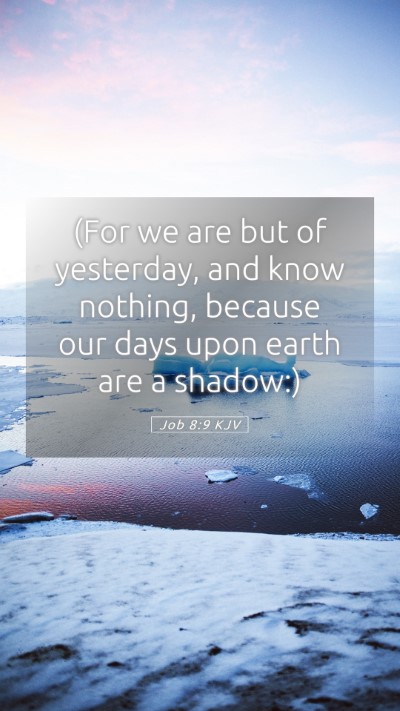Old Testament
Genesis Exodus Leviticus Numbers Deuteronomy Joshua Judges Ruth 1 Samuel 2 Samuel 1 Kings 2 Kings 1 Chronicles 2 Chronicles Ezra Nehemiah Esther Job Psalms Proverbs Ecclesiastes Song of Solomon Isaiah Jeremiah Lamentations Ezekiel Daniel Hosea Joel Amos Obadiah Jonah Micah Nahum Habakkuk Zephaniah Haggai Zechariah MalachiJob 8:9 Meaning
What is the meaning of Job 8:9?
(For we are but of yesterday, and know nothing, because our days upon earth are a shadow:)
Job 8:9 Bible Verse Meaning
Bible Verse Commentary: Job 8:9
Verse: Job 8:9 - "For we are but of yesterday, and know nothing; because our days upon earth are a shadow."
Understanding Job 8:9
The verse underscores the brevity of human life and the limits of human understanding in the grand scheme of existence. Below are insights based on public domain commentaries by Matthew Henry, Albert Barnes, and Adam Clarke.
Contextual Background
This verse is part of a dialogue between Job and his friends, where Bildad the Shuhite responds to Job's lament about his suffering. Bildad seeks to remind Job of mankind's frailty and the incomprehensibility of God's ways.
Commentary Insights
-
Matthew Henry's Commentary:
Henry emphasizes the "yesterday" aspect, illustrating the transience of human life. He notes that humans are "but of yesterday" in relation to eternity and God's everlasting nature. This suggests that our knowledge is limited and that we should approach God with humility.
-
Albert Barnes' Commentary:
Barnes highlights the metaphor of "a shadow," likening human existence to something insubstantial and fleeting. He elaborates on the idea that life is temporary; consequently, our understanding is limited because we only exist for a short time on Earth.
-
Adam Clarke's Commentary:
Clarke reflects on the ignorance inherent in human wisdom. He asserts that compared to divine wisdom, our knowledge is minuscule. Clarke reinforces the idea that we must seek divine revelation to gain true understanding.
Key Themes and Lessons
-
Brevity of Life:
Job 8:9 emphasizes that life is fleeting, which should inspire reflection on how we live and the eternal significance of our actions.
-
Lack of Human Understanding:
This verse teaches that relying solely on human understanding is insufficient. True wisdom comes from recognizing our limitations and seeking God's perspective.
-
Humility Before God:
Recognizing the brief nature of existence encourages humility, reminding believers to trust in God's infinite wisdom rather than their own understanding.
Applications in Daily Life
Understanding Job 8:9 can lead to profound applications in life:
- Embrace Humility: Recognize that we do not have all the answers and that asking for guidance through prayer is essential.
- Prioritize Relationships: Being aware of life's fleeting nature can motivate individuals to strengthen relationships with God and others.
- Focus on Eternal Values: This understanding promotes a shift in focus from temporary pleasures to what truly matters in an eternal sense.
Cross References
- Ecclesiastes 3:20 - "All go to one place; all are from the dust, and to dust all return."
- Psalm 39:5 - "Behold, You have made my days as handbreadths, and my lifetime is as nothing in Your sight."
- James 4:14 - "You do not know what your life will be like tomorrow. You are just a vapor that appears for a little while and then vanishes away."
Final Thoughts
Job 8:9 serves as a powerful reminder of the limits of human understanding and the importance of humility in our walk with God. Scripture analysis of this verse encourages believers to seek deeper biblical exegesis and understanding scripture with a heart open to divine wisdom.


